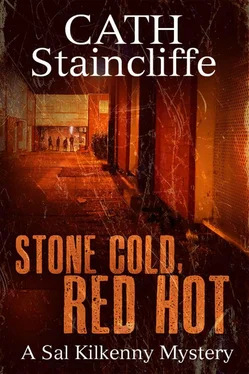“Bugger to varnish.”
I waited a beat or two sensing a slight awkwardness in the exchange. Nothing obvious. Symptomatic of how things had felt to me since Ray and Laura got involved with each other. He was always preoccupied. As if the rest of us had become minor supporting characters, there in the background but taken for granted. We definitely spent less time together and talked less. The worst thing was not being able to work out if my observations about the atmosphere were objective or if it was just my perception. It bugged me, it bugged me a lot.
Things were bound to change with a serious relationship, I kept telling myself, new lovers were notoriously selfish, maybe I was jealous (of Ray or of what they had?) Come on! I’d talk to Diane about it, my best friend, my confidante. She wouldn’t shy away from being honest with me.
Thursday morning and I had an appointment with Mandy Bellows at the Town Hall. Withington is about four miles south of the City Centre and Wilmslow Road links the two in a straight line but I don’t like doing that journey by bike so I got the bus in. That stretch has the dubious reputation of being the busiest bus route in Europe and although there are cycle lanes for part of it they are often used as handy parking spaces by motorists. You end up weaving in and out of aggressive traffic and waiting for the inevitable moment when some nerd does a sharp left turn across your handlebars or opens their door into you. Painful.
The bus journey was complicated by the annual intake of new students who were clutching maps and trying to find their way about, trying to get on the right bus to the right site on the right campus. Manchester boasts three universities and a handful of colleges and the city’s population leaps by thousands every autumn.
They were a feature at every bus stop. Thankfully our driver was helpful and courteous. He patiently pointed out where the bus would go, corrected people’s mis-pronunciations and called out loudly when we reached the various buildings on Oxford Road.
After living in Manchester, Keele would have seemed small to Jennifer Pickering, manageable. I’d a notion it was one of the out-of-town campus universities like Lancaster. I wasn’t even sure where it was, Midlands? Somewhere near Stoke perhaps.
If Jennifer had got pregnant she must have met someone fairly early in the term. It takes a few weeks to make sure and I knew that she’d left Keele and had broken off contact by the Christmas. If I could find any people who were students with her, maybe people who shared her accommodation and did English with her they would be pretty likely to know who the man involved was, a student or a lecturer? Secrets were hard to keep in the close environment of university life. I remember in my own case we seemed to know everything about who was screwing who, who was into drugs or had debts or got violent when drunk.
At the top of Oxford Road there were adverts for new apartments in the heart of the city. Some of them were selling for ludicrous prices. Manchester was the place to be. We had the best football team in the world (according to Ray) and had produced Oasis as well as Coronation Street. Time was people in Manchester felt overshadowed by the dominance of London; people moved south for the opportunity to develop. But these days Manchester was on a roll. The centre of the universe. A Manchester accent was an asset – chuck.
The bus swung round past Central Library with its domed roof and pillars and I got off when it stopped near Albert Square.
It was a mild, misty day, the air felt soft. The Gothic style Town Hall with its honey sandstone seemed to glow against the colours of the surrounding trees and the slate grey of the sky.
The Neighbour Nuisance Unit is upstairs but I had to report to the security desk on the ground floor and they rang for Mandy to come down and collect me. She led the way up the stone staircase, between marble pillars with vaulted ceilings, everything rich with intricate stone mouldings and carvings. She made us coffee before we settled at her desk in the corner of the open plan office. She picked up a file from the sea of paperwork that cluttered her desk and spilled over onto a side table as well.
“Mr Ibrahim and his family came here from Somalia in 98. Refugees. They had two children, now three. They managed to get asylum. They were in London originally then got moved up here. They were in homeless families accommodation for a while then we offered them a house in St Georges, in Hulme. They moved the first week of July. Since then there have been a series of incidents; verbal abuse, graffiti daubed on the house, stones thrown at the house, children threatened. They’ve reported it to the Housing Office and the police have cautioned some of those responsible.”
“Kids?”
“Not all of them. There’s a family on the Close who have a reputation for anti-social behaviour; the Brennans. Neighbours have made a number of complaints about them to the council already and some neighbours have been asked to keep a diary to record any incidents. We will be seeking a court injunction to get them to alter their behaviour but it’s going to take some time. However, there’s another family, the Whittakers, and they seem to be the ones who are particularly targeting the Ibrahims. We’ve not had prior complaints about the Whittakers though I believe Colin Whittaker is known to the police, he’s a member of some neo-Nazi group, he’s banned from football matches – that sort of scene. From what Mr Ibrahim tells me he wants them out and he’s making no bones about it.
“Now we can see about re-housing the family but as you know we would prefer to tackle the issue of antisocial behaviour or racial harassment and deal with those responsible. For that we need firm evidence to enable the police to take those involved to court. That’s where you come in. We can give you a camcorder and one of the neighbours is prepared to let us use one of his rooms for surveillance. He’s told us a lot about what’s actually going on. I think he’d do it for us himself if we asked him but we need a professional job doing. You’ll have to sort out a cover story, visiting relative or some such.”
My stomach missed a step. Surveillance is a mixture of dull and dangerous. But undercover work which I have done on occasion demands even more nerve and involves playing a part with enough aplomb to convince. Surveillance is covert; the main aim to observe without being noticed, ninety-nine percent of the time it’s a bore. Undercover work is both overt and covert, it involves being seen and being believed, fitting in or getting found out. The adrenalin never lets up, it can be terrifying. It is never boring.
“You know I can’t do twenty-four hours?”
“We can work round that. The harassment usually happens when Mr Ibrahim is at work, in the evening. He’s got a job at a take-away in Chorlton.”
“So Mrs Ibrahim’s on her own with the children then?”
“Yes. It’s not Mrs Ibrahim though, they have a different custom for names, she keeps her father’s names even though she’s married. All Somali’s have three names, the children will take two of their father’s names and be given a name too. So even they won’t be known as Ibrahim. It gets very complicated,” she smiled, “well, it does for us as you can imagine but the Somalis know exactly what’s what.” She checked the file. “She’s called Fatima Hassan Ahmed, so you can call her Mrs Ahmed or Fatima – that’s her given name. Now, there have been incidents at the weekends too and they seem to be increasing in frequency. We’d like you to start with a night this weekend, his shift is six to two, you could cover that. I’m hoping you’ll be able to get the general picture, maybe do another night if you need to. In addition to that I want you to be on call – we’ll ask Mr Poole, that’s the neighbour, to ring you if trouble starts. The Ibrahims don’t have a phone. Mr Poole has called the police for help in the past though he doesn’t want it broadcasting.”
Читать дальше












